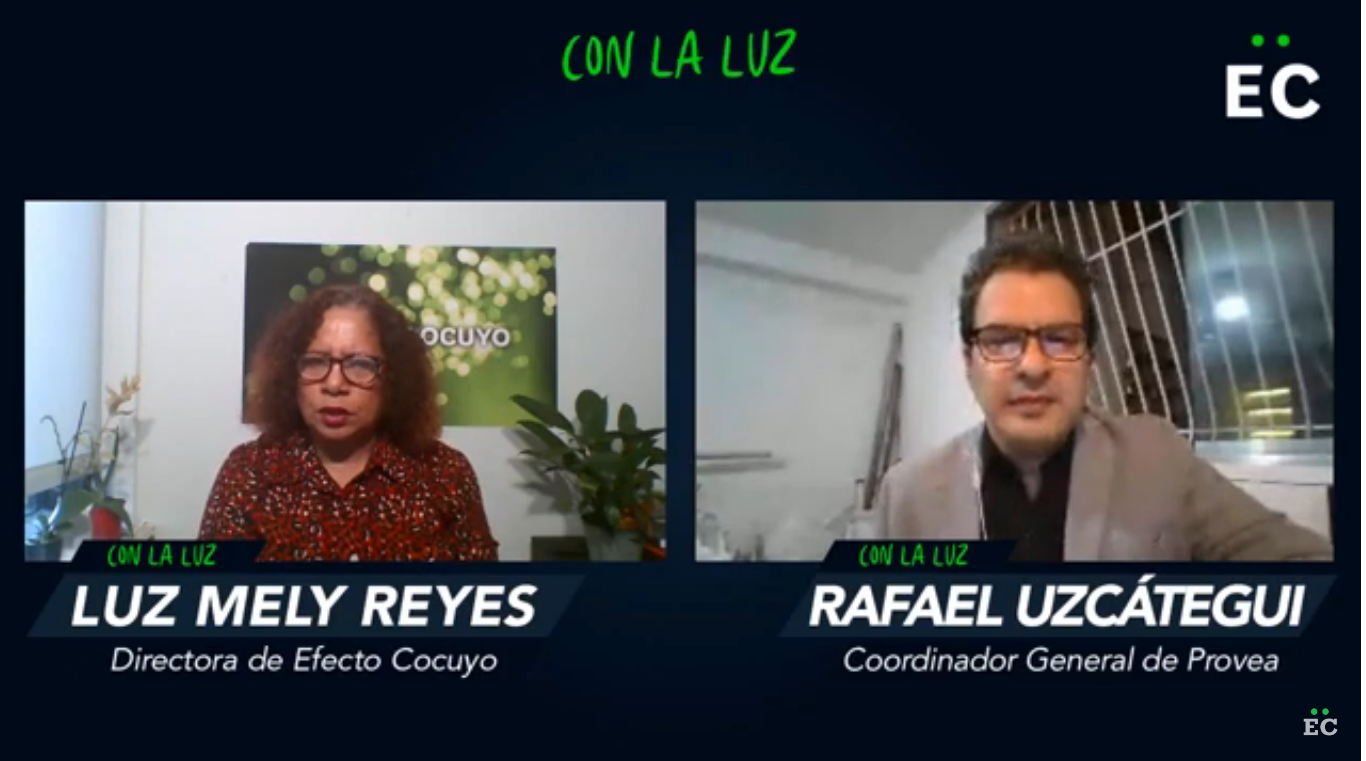Venezuela enters 2021 as a de facto State forged by institutions that, over the last two decades, have risen in contravention of the Constitution; This has allowed the authorities of the ruling party to hold to power and ultimately impose their political model.
As has been repeatedly denounced, this process of institutional breakdown accelerated after the opposition won the parliamentary elections in December 2015, at which point the Government of Nicolás Maduro unloaded its artillery to prevent and neutralize the operation of the Legislative organ, as well as reinforcing control in all areas of civil life and the consequent elimination of people’s rights and constitutional guarantees.
Nowadays, all subjection or subordination of the institutions to the constitutional norms and international human rights treaties in force in Venezuela has been eliminated. In fact, the National Executive branch is above the rest of the public powers thanks to several rulings from the Constitutional Chamber of the Supreme Tribunal of Justice (TSJ) that differ greatly from the content and spirit of the national Constitution and has allowed the government to seize absolute power.
To describe the factual institutional reality that exists in Venezuela, it is enough to review some of the situations that have occurred throughout this period, which not only represent a violation of the constitutional order but have also led to the creation of a parallel state that openly clashes with the organizational and functional platform contemplated in the Constitution, all to allow the Executive branch to govern without any type of control or obstacle.
1-. The rushed appointment of the magistrates of the Supreme Tribunal
The appointment of the authorities of the country’s highest court has been outside the constitutional norm since the time Chavismo rose to power in 1999. However, it reached a zenith in 2015 when the National Assembly dominated by the ruling party appointed thirteen magistrates and twenty substitutes, obviating the steps contemplated in the Constitution and the legislation that governs the matter.
As if it was not enough, very few of the 32 magistrates of the Supreme Tribunal of Justice appointed since 2010 meet the minimum requirements to hold the position. The move was one of the key actions of the Government of Nicolás Maduro since control over the TSJ would guarantee stability and permanence in office.
A third of the 32 magistrates of the Supreme Tribunal were government officials or have relatives in public positions, while only two have opposed decisions that openly favor the interests of the Government.
2-. The irregular appointment of the CNE rectors
Another notorious example of the violation of the constitutional text occurs when, illegitimately, the country’s highest court decides to assume the appointment of the members of the National Electoral Council (CNE), in contravention of the provisions of article 296 of the Constitution establishing that it is the prerogative of the National Assembly by the vote of 2/3 of its members.
Since 2003, the Constitutional Chamber has been given the task of appointing all CNE rectors, both head and deputies, a practice that repeated in 2005 after a partial renewal of the members, and then again in 2014 and 2016; on only two occasions was the appointment made by the Parliament (2006 and 2009).
As if it was not enough, in 2020 the Chamber took absolute control over this function and appointed the five main rectors and ten deputies of the electoral body without fulfilling all the necessary steps, seeking to guarantee government control in the organization of the parliamentary elections held on December 6 of that same year, in which the alliance of the ruling party prevailed with more than 67% of the votes.
Thanks to this practice, the Constitutional Chamber has taken over the electoral administration, imposing a CNE of partisan dominance and in favor of the interests of the national government.
3-. The arbitrary Appointment of the Republican Moral Council
Another worrying situation is the appointment of the members of the Republican Moral Council (The Ombudsman, the Public Ministry and the Comptroller General of the Republic), carried out without complying with the guidelines established in the Constitution.
When Hugo Chávez assumed power in 1999, he sought to dominate all the public powers of the country, and the National Constituent Assembly (ANC) was a key piece for this. The ANC was subjected to the designs of the late president, and under the excuse that it was supra-constitutional, it imposed on the authorities of each of the organs that make up the new Citizen Power, regardless of what the fundamental text said.
The same situation arose when the National Assembly elected in 2000 promoted a law for the election of the members of the public powers which excluded the representation of civil society, in frank violation of Article 279 of the constitutional charter. This has allowed the Executive branch to have under its control the citizens branch, responsible for criminal investigation, the fight against corruption and the defense of human rights, among other things.
These changes resurfaced in 2017 when the National Constituent Assembly decided to appoint the heads of the Ombudsman’s Office, the Public Ministry and the Comptroller General of the Republic. This Constituent Assembly was summoned by Maduro without following the constitutional procedure and in usurpation of the exclusive power of the sovereign subject in order to neutralize the opposition-controlled National Assembly.
It should be noted that a few days after its installation, the ANC dismissed the attorney general, Luisa Ortega Díaz, and appointed the ombudsman, Tarek William Saab, as head of the Public Ministry and his deputy as substitute defender after the former prosecutor fell out of favor with the national government for her comments against rulings 155 and 156 of the Constitutional Chamber, which had stripped the National Assembly of its powers and declared it in contempt.
4-. The fraudulent elections of 2017, 2018 and 2020
Another irregular case that proves the existence of a de facto State is the holding of elections outside the Constitution and international standards in 2017, 2018 and 2020, through arbitrary procedures from an electoral body that, indisputably, favored the ruling party to the detriment of the opposition, the will of the voters and democratic alternation.
The election of the Constituent Assembly (July 2017); the election of state governors (October 2017), mayors and municipal councils (December 2017); the presidential election and the election of state legislative councils (May 2018), and the recent parliamentary elections (December 2020), were marked by different constitutional and legal violations, such as the outlawing and judicial intervention of opposition parties, the ban against opposition leaders, the exchange of food for votes, the installation of stands of the ruling coalition near voting centers so that voters could check in with the so-called Carnet de la Patria; and the modification of the electoral system.
These actions affected the transparency, integrity and impartiality of these elections and have called into question the legitimacy of the elected authorities. Therefore, it was no surprise that the United Socialist Party of Venezuela (PSUV) swept all elections and Maduro got re-elected as president in a process marked by a series of electoral crimes, including being summoned in advance by the National Constituent Assembly for a date contrary to the democratic tradition of Venezuela. Furthermore, Maduro was illegitimately sworn in before the Supreme Tribunal, a body that lacks the competence to swear in officials elected by popular vote.
Special mention should be made of the parliamentary elections of December 6, 2020, designed to suit the political interests of the Maduro Government by a National Electoral Council that failed to comply with the minimum standards to guarantee a fair, free and transparent process.
The scenario described allows us to affirm that in Venezuela there is a deep institutional crisis that has turned the rule of law into a de facto State, where all public powers are illegitimate and unconstitutional, since none of its authorities has been designated or selected according to the norms nor respecting the basic principles to guarantee their autonomy, the separation of powers and democracy; all of this under the worrying acquiescence of the Supreme Tribunal.
How does it affect Venezuelans?
Unfortunately, 2021 marks an institutional setback for Venezuelans, which is accompanied by the humanitarian tragedy and the ravages of the COVID-19 pandemic, exposing an inefficient government that does not address the continuous claims of citizens regarding the serious and complex crisis in the country, nor does it use its power to reestablish the broken institutionality by its own hand.
The implantation of institutions in denial of the provisions of the Venezuelan Constitution only confirms the rupture of the constitutional order and, consequently, the rule of law, respect for human rights and democracy.
Translated by José Rafael Medina




